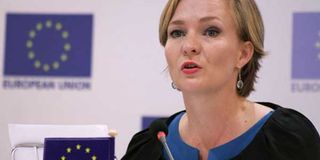Delaying report was against MoU, says European Union

Ms Marietje Schaake, European Union’s chief observer in the August and October 2017elections who released a report on the polls at the EU parliament on January 10, 2018. FILE PHOTO | NATION MEDIA GROUP
What you need to know:
- Ms Martietje Schaake suggested to the Nation that Kenya was violating its commitments with the EU when it asked for a postponement of the publication date.
Kenya’s Ambassador to the EU, Johnson Weru said the government was protesting the “procedural and premature manner.”
The observation team came to Kenya courtesy of a memorandum of understanding signed between Kenya, EU and the IEBC on June 8 last year.
Monica Juma and IEBC chairman Wafula Chebukati signed on the document which provides that the Mission was required to submit a preliminary report to the government any time after Election Day.
The European Union election observation mission says it declined a request by Nairobi to publish its report in March because this would go against the very agreement it signed with Kenya.
Chief Observer of EU’s Election Observation Mission Martietje Schaake suggested to the Nation that Kenya was violating its commitments with the EU when it asked for a postponement of the publication date.
Amid the accusations from Nairobi that the European body had released the report “prematurely,” Ms Schaake admitted it had been requested to shelve the idea over unspecified reasons, but refused because the suggested dates contradicted its commitments.
“The MoU does not include a requirement for consultation on the release date of the final report, it just specifies that this should be within three months of the election.
“We were committed to doing this, not least so that our findings would be available to the Kenyan people and our recommendations could contribute to reform,” she told the Nation.
MONITORED ELECTIONS
The EU observation team that monitored Kenya’s elections last year published its report last week. But it immediately elicited protests from Nairobi arguing the Mission had broken provisions of the Memorandum of Understanding.
Kenya’s Ambassador to the EU, Johnson Weru said the government was protesting the “procedural and premature manner.”
“Her action has breached the terms of the Memorandum of Understanding on election monitoring with the European Union, which called for the structured official process,” he said.
The envoy alleged that the EU Mission had initially agreed to reschedule the release in mid-February or March, and accused EU of flouting the agreement with “such cynical ease.”
Ms Schaake (right), a Dutch politician who is also a member of the European Parliament, told the Sunday Nation that her team is still willing to meet with the Kenyan envoy, but added that the request for a later date was impossible because of EU regulations.
“My agenda is very full with commitments in the European Parliament and elsewhere, so I am unfortunately not available to travel to Nairobi again until mid-March,” she said.
“This is a long time after the October elections, and beyond the commitment we made in the MoU to release our report within three months of the elections.”
SUBMIT REPORT
The observation team came to Kenya courtesy of a memorandum of understanding signed between Kenya, EU and the IEBC on June 8 last year. EU Head of Delegation Stephano Dejik, Kenya Foreign Affairs PS Monica Juma and IEBC chairman Wafula Chebukati signed on the document which provides that the Mission was required to submit a preliminary report to the government any time after Election Day.
“The Chief Observer will present the final report of the EU EOM to the government of the republic of Kenya and a copy to the Independent Electoral and Boundaries Commission. This will take place between one and three months after Election Day,” the document further says of the final report.
Kenya protested the publication via video link from Brussels, arguing the Mission was supposed to present it on Kenyan soil and share it with stakeholders. While the MoU does not state this clearly, it is the tradition by election observers to release their monitoring reports in territories where the election happened.
Yesterday, sources indicated that the Kenyan government was particularly not happy with an indictment on security forces in the report and an accusation of using state resources by the Jubilee side.
“This accusation was raised in the second petition to the Supreme Court. The court exonerated the candidate,” a Kenyan diplomat told the Sunday Nation on the background, referring to the petition filed to challenge President Kenyatta’s victory on October 26.
STATE RESOURCES
The judges absolved President Kenyatta from blame of using Cabinet secretaries and state resources to campaign for him, and upheld his election victory.
“Besides, security forces were mainly using force equivalent to the people they were dealing with. There are areas where opposition supporters attacked polling officials and made sure no voting took place,” the official added, referring to four counties in Luo Nyanza where the IEBC was unable to conduct the repeat election.
While this matter of security was raised in the court, the judges generally said the petitioners and the Nasa coalition (who were 4th respondents) had engaged in “bad faith” by deliberately causing violence to influence postponement of the entire poll.
SUPREME COURT
But Mr Weru, who accuses the chief observer of “personalising” the team’s work during elections, had been one of Kenya’s diplomats in the West who approached key leaders to endorse President Kenyatta’s victory, according to a report published in the Financial Times in November. The US and the UK immediately congratulated the President but some key EU members waited until after the Supreme Court verdict and after the inauguration before sending their congratulations.
Whether the tiff between Nairobi and Brussels signifies deeper problems, it could signal a disadvantage for Kenya.





